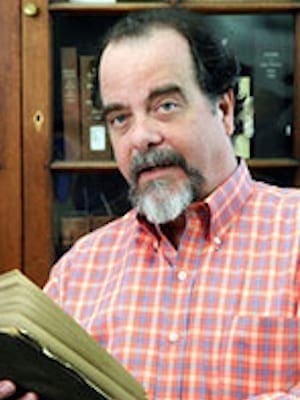Can Jews, Christians and Muslims coexist? Yes.
Imagine a man who, as a child, lived next to a synagogue in the West Indies and attended a Dutch Reformed church.
Imagine, further, the same man as a young adult who arrived in Liberia under the auspices of the New York Colonization Society and, with funding from white U.S. Presbyterians, was educated in a mission school in Monrovia, where his fascination with Jewish history helped create a passion to learn Hebrew as a way of getting to the bottom of false claims that divine providence had assigned the descendants of Ham to a life of servitude.
Now, imagine the same man in the twilight of a phenomenal vocation as teacher, missionary, statesman, explorer and activist sitting quietly in the administrative office of a mosque in Sierra Leone overseeing a national program to educate Muslim children.
Edward Wilmot Blyden (1832-1912) is the real man you imagined.
His life and legacy don’t get the attention they deserve, especially in the contemporary context created by the perceived and real conflicts among the Abrahamic religions: Judaism, Christianity and Islam. That is a shame.
I add that, for those who give attention to Blyden, there is more than Abrahamic religious harmony that animated this intellectual giant of the 19th century.
Start turning the pages of Blyden’s life and you will find the source of a broad, long shadow still visible in many places early in the 21st century.
In 1898, Blyden published an essay, “The Jewish Question,” in a British periodical. He began with reminiscence: “I was born in the midst of Jews in … St. Thomas.”
He comments upon his excitements about “the annual festivals and feasts,” especially the “Day of Atonement,” recounting how he and his Christian friends assembled on “a terrace immediately above” the synagogue to “look down upon the mysterious assembly.”
He concludes the introduction by noting that the “awe and reverence” of those experiences “have followed me all the days of this life.”
The essay goes on to engage the seminal work of Theodor Hertzl, the intellectual father of Zionism. Blyden suggests, “The Jew has a far higher and nobler work to accomplish … than establishing a political power in one corner of the earth.”
He concludes: “The message of the great Zionist movement to the Jews, … is to rise from their neutrality and cooperating with … their children – Christianity and Islam – work for the saving of mankind … from a deadening materialism.”
Blyden’s context, West Africa, prevented him from much practical engagement of “the Jewish question,” but that was not the case with Christianity and Islam.
In 1887, Blyden’s sweeping life’s work, “Christianity, Islam, and the Negro Race” (CINR) was published; it was so well received that the next year it came out in a second edition. The book remains in print.
The connecting thesis of CINR is driven by missions. Blyden acknowledges the common origins of Christianity and Islam in the bosom of Abraham (that is, Judaism) while at the same time noting the differences among the religions.
In the end, Blyden appeals for and practically engages cooperation. His profound sense of providence led Blyden to conclude that missions should be about basic education – teaching children to read and write and think and grow in the place where they are planted.
Pointing to the successes of Muslim missions surrounding the mosque school where children became literate in more than the Quran, Blyden called for Christian missions to invest in education, too.
He was convinced that Christians and Muslims (and, by association, Jews) could and should teach the children and make room for the spirit of God to transform Africa, not by importing foreign cultures under the guise of religion.
On Feb. 8, 2013, I was in Freetown, Sierra Leone. It was 101 years – plus one day – since Blyden died there.
My Liberian colleague and friend, Olu Q. Menjay, and I visited Blyden’s grave in the company of his great-granddaughter, Isa Blyden.
For eight hours she escorted us through Freetown, showing us where Blyden lived out his passions for education, missions and harmony.
The highlight of the day was, for me, a visit to the mosque in the Foulah district of Freetown where Blyden established the first school for Muslim children in West Africa.
We met the imam and were warmly greeted by Muslim men and women arriving for Friday prayers.
Coexistence is possible. I saw it and experienced it in Freetown.
Richard Wilson is the Columbus Roberts Professor of Theology and Chair of The Roberts Department of Christianity in the College of Liberal Arts at Mercer University in Macon, Ga. He blogs at Revisiting Liberia. This column first appeared in the February 2013 Baptist Studies Bulletin of the Baptist History and Heritage Society and is used with permission.

